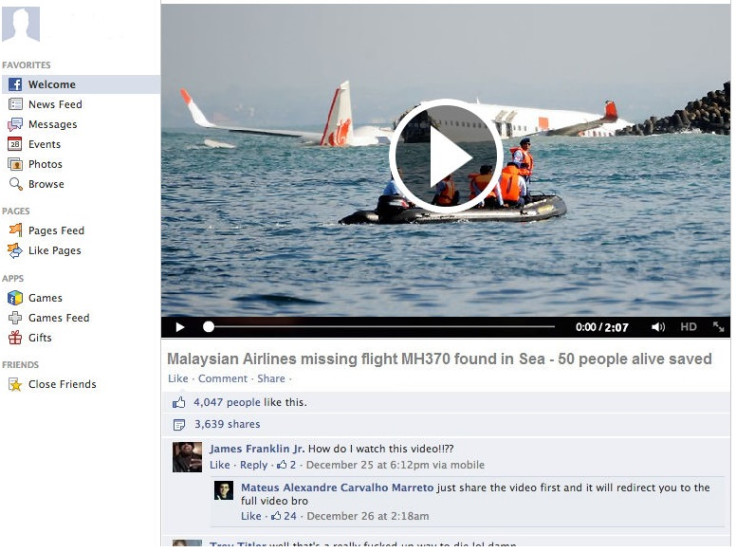Missing Malaysia Airlines Flight MH370: After Bermuda Triangle Hoax, Criminals Exploit Facebook with Fake Stories

After the Bermuda Triangle hoax about the missing Malaysia Airlines flight MH370, there has been an explosion of bizarre stories on the social media claiming the plane has been found and the passengers are safe.
Here is a sample of such stories:
"Shocking Video: Malaysian Airlines missing flight MH370 found at sea"
"Malaysian Airplane MH370 Already Found. Shocking Video Release Today by CNN"
"Plane has been spotted somewhere near Bermuda triangle. Shocking videos released today. CNN news"
"MH370 Malaysia plane has been found. Shocking videos released today. Last video of passengers crying released"
Many of the posts are embedded with catchy phrases like "Breaking", "Shocking Video" and "People found alive".
In his blog, malware intelligence analyst Christopher Boyd warns: "Not all of the video links being posted to social networks are sensationalist in nature – along the 'shocking video' nonsense there's quite a few others which instead offer false hope to anybody waiting for the first 'survivors found' news to be posted somewhere legitimate."
Twitter and Facebook seem to be the preferred sites for the fake stories.
"We first saw the links spreading on Twitter. [They were] a mixture of tweets leading to known sites originally posted to Facebook and a new batch of spamblogs, survey scams [and] imitation news sites," Boyd told the Wired.co.uk.
Similar techniques had been employed by scammers during the Japanese tsunami in 2011 and the Philippines earthquake in 2013.
Boyd adds: "They ranged from Malware and 419 scams to fake donation pages and search engine poisoning. Anything involving a potential disaster is big money for the scammers, as there's a split between clickers with a penchant for salacious content and those who simply want to know if a relative is okay or if there's any more news on a breaking disaster."
It is feared that some of the links might prompt users to take part in surveys wherein they enter their personal information which could be exploited by marketers and hackers.
© Copyright IBTimes 2025. All rights reserved.




















